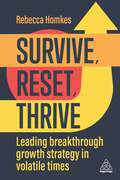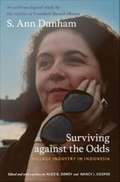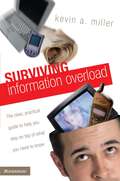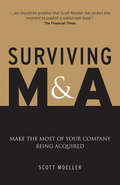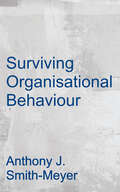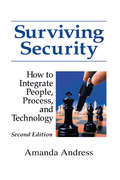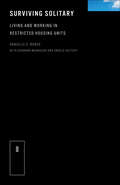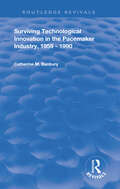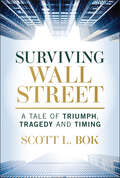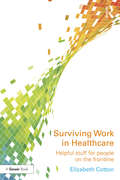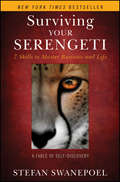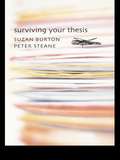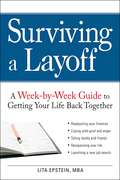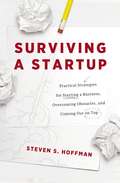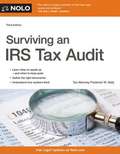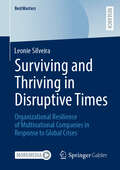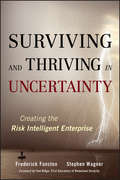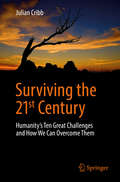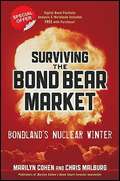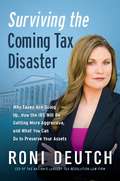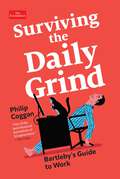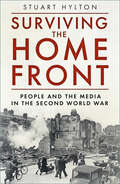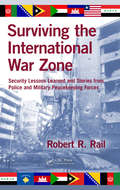- Table View
- List View
Survive, Reset, Thrive: Leading Breakthrough Growth Strategy in Volatile Times
by Rebecca HomkesUncertainty is here to stay. Rather than seeing it as an obstacle to overcome, integrate it into your strategic approach to invigorate your high-growth potential and outperform competition under any market condition.Strategy is about making choices around where to play and where not to play, how to win, how to allocate resources among competing priorities and, critically, what to do. All these choices must be made when you never know everything you would like to know. This book is about facing uncertainty head-on and then playing each round to not just survive, but thrive. Doing so only comes from the power move of executing a reset: the differentiated step where you embrace change, new insights and new opportunities to set your organization up for sustainable performance.Survive, Reset, Thrive is a playbook for leaders derived from the author's first-hand experience working with executive teams across industries from software, technology, retail, fashion and construction through to manufacturing. Drawing from over a decade of rich real-world experience, the author illustrates how to navigate the most complex strategic situations with a simple, executable approach. Rebecca Homkes explains how proactively to stabilize your business to withstand and grow through market shocks, reset your strategy to take account of new realities and thrive through uncertainty.
Surviving Against the Odds: Village Industry in Indonesia
by S. Ann DunhamRead the foreword by Mara Soetoro-Ng President Barack Obama's mother, S. Ann Dunham, was an economic anthropologist and rural development consultant who worked in several countries including Indonesia. Dunham received her doctorate in 1992. She died in 1995, at the age of 52, before having the opportunity to revise her dissertation for publication, as she had planned. Dunham's dissertation adviser Alice G. Dewey and her fellow graduate student Nancy I. Cooper undertook the revisions at the request of Dunham's daughter, Maya Soetoro-Ng. The result is Surviving against the Odds, a book based on Dunham's research over a period of fourteen years among the rural metalworkers of Java, the island home to nearly half Indonesia's population. Surviving against the Odds reflects Dunham's commitment to helping small-scale village industries survive; her pragmatic, non-ideological approach to research and problem solving; and her impressive command of history, economic data, and development policy. Along with photographs of Dunham, the book includes many pictures taken by her in Indonesia. After Dunham married Lolo Soetoro in 1967, she and her six-year-old son, Barack Obama, moved from Hawai'i to Soetoro's home in Jakarta, where Maya Soetoro was born three years later. Barack returned to Hawai'i to attend school in 1971. Dedicated to Dunham's mother Madelyn, her adviser Alice, and "Barack and Maya, who seldom complained when their mother was in the field," Surviving against the Odds centers on the metalworking industries in the Javanese village of Kajar. Focusing attention on the small rural industries overlooked by many scholars, Dunham argued that wet-rice cultivation was not the only viable economic activity in rural Southeast Asia. Surviving against the Odds includes a preface by the editors, Alice G. Dewey and Nancy I. Cooper, and a foreword by her daughter Maya Soetoro-Ng, each of which discusses Dunham and her career. In his afterword, the anthropologist and Indonesianist Robert W. Hefner explores the content of Surviving against the Odds, its relation to anthropology when it was researched and written, and its continuing relevance today.
Surviving Information Overload: The Clear, Practical Guide to Help You Stay on Top of What You Need to Know
by Kevin A. MillerThe barrage of emails, voicemail, web pages to scan, books to read, and magazines and newsletters to digest leave people increasingly feeling overwhelmed and out of control in dealing with information overload as society spins even faster. This book offers a brief, seven-chapter practical guide to the "capture" approach. It teaches the skills of point, focus, and shoot to help the reader become more productive and overcome mental fatigue. This is not a gimmick for "neat desk" people or an expensive system requiring purchase of multiple resources or practice of rigid exercises. This practical, quick-read book shows how people of any temperament can keep from drowning in the sea of information. Features include interviews and insights from national leaders plus charts, cartoons, worksheets, and creative exercises. The book is not about how to speed up but how to gain time and focus and purpose and the mental space to be creative. You don't have to finish the book but can read it selectively at different times depending on your current needs. Feel free to skim-read, tear out pages, email small sections to a friend, or read from back to front. The goal is that you come away with ideas and help. The four sections are: 1. Finding the information you need: and getting results from it. 2. Clearing information clutter: less is more. 3. Creating space to think: finding oasis amid overload. 4. Discovering bonus stuff: it doesn't cost you anything extra. This clear, practical guide will help you to: -Sort and organize information in less time -Make space to be creative -Find just the information you need when you need it -Move from frantic to purposeful -Keep growing over a lifetime.
Surviving M&A
by Ron Ashkenas Mitchell Lee Marks Philip Mirvis"For individual managers and employees, a merger or acquisition is not just a corporate strategy; it’s a personally disruptive—often traumatic—event. What C-suite executives and consultants euphemistically call “postmerger integration” is typically a period of tension, uncertainty, and even chaos. Workloads ramp up, as do pressure and stress. You may have to quickly adapt to unfamiliar policies, practices, and politics; work with strangers from different corporate or even national cultures; or report to new bosses who know nothing about your track record or ambitions. Meanwhile, there is no guarantee of a job with the resulting organization, let alone a long-term career. On average, roughly 30% of employees are deemed redundant after a merger or acquisition in the same industry."
Surviving M&A
by Scott MoellerPractical tips and real-world advice for thriving professionally in the midst of a major M&A dealAs a follow-up to his highly popular book Intelligent M&A, author Scott Moeller expanded the chapter on surviving a merger into an in-depth discussion of the subject. Surviving M&A offers practical advice for professionals who worry about their jobs while their organizations are embroiled in the turmoil of a merger or acquisition. Moeller not only shows readers how to keep their jobs safe, but how to turn lemons into lemonade and actually move up the corporate ladder during the chaos of M&A. For anyone in this precarious position, this book offers smart ideas and winning tactics.
Surviving Organisational Behaviour: Unleashing The Power Of Purpose, Culture And Values
by Anthony Smith-Meyer André Nussbaumer Kiely KuligowskiThis is a management book written with the business school undergraduate in mind, using a language and examples that students can relate to. The author has taught business and management for several years, but draws on his experience spanning decades in banking and finance, commerce, risk management and compliance, and governance to explain how academic theory and practice combine in the workplace. The sub-title of this book is “Unleashing the Power of Purpose, Culture and Values”, and the subject matter draws on the schools of positive psychology and organisational behaviour. Some students find this strange, expecting management studies to be about the balance sheet, accounting, marketing and other skills associated with running a business. This is to misunderstand the essential and most challenging part of management, however; that of creating a working environment that encourages the right kind of work ethic, and selecting, managing and motivating the right people to work for the organisation, its purpose and success.
Surviving Security: How to Integrate People, Process, and Technology
by Amanda AndressPrevious information security references do not address the gulf between general security awareness and the specific technical steps that need to be taken to protect information assets. Surviving Security: How to Integrate People, Process, and Technology, Second Edition fills this void by explaining security through a holistic approach that conside
Surviving Solitary: Living and Working in Restricted Housing Units
by Danielle S. RudesTwenty to forty percent of the US prison population will spend time in restricted housing units—or solitary confinement. These separate units within prisons have enhanced security measures, and thousands of staff control and monitor the residents. Though commonly assumed to be punishment for only the most dangerous behaviors, in reality, these units may also be used in response to minor infractions. In Surviving Solitary, Danielle S. Rudes offers an unprecedented look inside RHUs—and a resounding call to more vigorously confront the intentions and realities of these structures. As the narratives unfold we witness the slow and systematic damage the RHUs inflict upon those living and working inside, through increased risk, arbitrary rules, and strained or absent social interactions. Rudes makes the case that we must prioritize improvement over harm. Residents uniformly call for more humane and dignified treatment. Staff yearn for more expansive control. But, as Rudes shows, there also remains fierce resilience among residents and staff and across the communities they forge—and a perpetual hope that they may have a different future.
Surviving Technological Innovation in the Pacemaker Industry, 1959-1990
by Catherine M. BanburyFirst published in 1997, this study looks at the aspect of technological innovation that firms must constantly address if they are to remain viable concerns. The chapters document key theories and ideas that have played an important role in the evolution of current understanding of how technologies change and how such changes come to be adopted by the market system; hypotheses within a specific empirical context; namely, the pacemaker industry since its commercial beginnings in 1959 until 1990; how the various dependent and independent variables are constructed; and finally the results of the empirical analysis.
Surviving Venezuela's Hyperinflation: Automercados Plaza's
by Mariana Cal Alberto F. Cavallo Carla LarangeiraUnder the rule of presidents Hugo Chavez and Nicolas Maduro, Venezuela experienced one of the worst economic and political meltdowns in modern history, culminating with a massive hyperinflation. Remarkably, during this dramatic times Automercados Plaza's had grown to become one of the most successful supermarket retailers in the country. Its management team had faced all kinds of challenges, including price indexation, price controls, scarcity and stockouts, informal competitors, and an ever-shifting set of government interventions. Showing resourcefulness and the flexibility needed to quickly adapt, Plaza's had managed to survive and even thrive. The future, however, looked very uncertain. Could Plaza's keep growing in an ever-shrinking economy? Would the (now larger) company manage to continue to avoid clashing with the government? Cheap financing in bol vares was no longer available, and other companies had learned to operate under high inflation conditions as well. While additional growth could help fend off new rivals if the economy improved, it was not clear when (or even if) that would happen. Despite increasing domestic and international pressure, President Maduro refused to resign. Even if he did, could Venezuela's economy recover after more than two decades of Chavismo?
Surviving Wall Street: A Tale of Triumph, Tragedy, and Timing
by Scott L. BokM&A dealmaker's real-life adventure tale tells the story of a turbulent period on Wall Street Surviving Wall Street: A Tale of Triumph, Tragedy and Timing portrays the dramatic transformation of the investment banking business in recent decades through the tumultuous saga of one firm (Greenhill & Co., a specialist in mergers and acquisitions) and one man (Scott Bok, the longtime CEO of that firm). Written in the style of an adventure tale, this book is also a "coming of age" story for a naive young man who came to Wall Street—as thousands like him do each year—and managed to grab a front-row seat for a period of epic change. Readers will gain an insider's perspective on: A M&A firm's journey from start-up to wildly successful first-of-a-kind IPO and later to a sale to a major global bank Numerous crises that rocked Greenhill and all of Wall Street, including the dot-com crash, global financial crisis and pandemic How the creation of new firms and mergers or collapses of old ones have driven the evolution and growth of the industry The author's role in a battle for control of the University of Pennsylvania that featured activist shareholder and corporate takeover tactics A firsthand account of deals and dealmakers told from inside the boardroom, Surviving Wall Street will captivate those wanting to understand the dramatic evolution and expansion of Wall Street, as well as younger readers hoping to chart their own path to success in this Darwinian industry.
Surviving Work in Healthcare: Helpful stuff for people on the frontline
by Elizabeth CottonThe book takes as its starting point the crisis of healthcare in the UK: impossible health targets managed through command and control management and a stomach-churning rise in racism, whistleblowing and victimisation in the NHS. The use of nationally set productivity targets combined with austerity cuts have increasingly put clinical best-practice into direct conflict with funding. Health targets have become politically controlled, and performance has become a cynical exercise in ticking boxes, cascaded within trusts and bulldozed through frontline services. This has led directly to a precarious system of employment relations, subject to the continual restructuring of services rather than the goal of creating functioning interdisciplinary teams that stand a chance of capturing clinical excellence. This book is written for workers and managers who are on the frontline of the battle for decent healthcare. The content of this book is based on the ‘ordinary’ expertise of the people who are actually surviving it and helpful ideas about making the best out of a bad lot. Surviving Work in Healthcare will be of interest to healthcare professionals and anyone working on the frontline of healthcare as well as students of management, human resources and psychology.
Surviving Your Serengeti: 7 Skills to Master Business and Life
by Stefan SwanepoelAs a brutal business environment meets a soft economy, business leaders and managers are looking for sources of both inspiration and survival. This compelling new fable offers a riveting tale of life in Africa's Serengeti and what lessons it holds for today's beleaguered business people and struggling society. <P><P> The 1.5 million wildebeest rely on stubborn endurance and support from the herd to survive; the crocodile is opportunistic; the cheetah ruthlessly effective; the giraffe embodies grace, the lion a master strategist, the mongoose is a risk-taker, the elephant is an excellent communicator.
Surviving Your Thesis
by Suzan Burton Peter SteaneFrom choosing a supervisor and topic to staying motivated, completing a research thesis is not an easy matter. Each stage represents a different challenge and many students struggle through without identifying the skills needed to make the most of their time. This wonderful resource for all doctoral and masters level students, explores the challenges and complexities of successfully engaging in the research process and thesis writing. Chapters include: choosing and working with a supervisor developing a research proposal motivating yourself choosing the right research method responding to criticism advice from the examiners preparing work for publication. This clear and practical guide, ideal for all doctoral and masters level students, takes readers from the very early stages of the process through to the final phase of examination and publication, using vignette examples to highlight key issues.
Surviving a Layoff: A Week-by-Week Guide to Getting Your Life Back Together
by Lita EpsteinBeing laid off is a traumatic event. Downsized workers must face decisions about reorganizing their lives and their finances, while grappling with the emotional grief of losing a job. This book is a practical guide to dealing with the tough questions a layoff poses. Using a week-to-week timeline, the book offers advice on such topics as: coping with grief and anger after a downsizing; reorganizing life after a layoff; how to launch a job search; balancing the job search with family and personal time; explaining a layoff to family and friends; and more. This book will show downsized workers how to reorganize schedules, set financial and organizational priorities, and go for their next job with confidence and enthusiasm.
Surviving a Startup: Practical Strategies for Starting a Business, Overcoming Obstacles, and Coming Out on Top
by Steven S. HoffmanThe CEO of Founders Space, one of the world's leading startup incubators and accelerators, prepares entrepreneurs to avoid disastrous mistakes, surmount sizable obstacles, and master the skills necessary to make the right choices along their path to success.The fact is, over 90 percent of all new startups fail. Every entrepreneur must face this harsh reality and learn to master it if they hope to survive and wind up on top.In Surviving a Startup, Steve Hoffman, the CEO of Founders Space, brings readers on a wild ride, sharing with them the tumultuous journey of launching a venture-funded startup and revealing what it takes to make it.This one-of-a-kind guide: Provides deep analysis and insights into the major challenges every entrepreneur faces when launching a business.Prepares entrepreneurs to make the best possible decisions and deal with crisis situations.Illuminates strategies for raising capital and growing a business, even when it seems impossible.Divulges secrets on how to manage difficult employees, demonstrate leadership, and overcome disasters.Describes the essential traits that enable startup founders to survive and succeed.Reveals the best way to develop innovative products, conduct guerilla marketing campaigns, obtain PR, and outmaneuver competitors.Shows how to recruit the best talent, even with no money, manage highly efficient teams, and motivate employees to go above and beyond their assigned responsibilities.Lays out the steps necessary to take a fledgling idea and transform it into a robust, rapidly growing business that has the potential to become the next multimillion-dollar acquisition or IPO.As the captain of one of the world's leading startup incubators and accelerators, Steve knows what it's like to be on the front lines, how tough it can get when the battle turns against the entrepreneur, and what it takes to taste victory and overcome seemingly impossible odds.
Surviving an IRS Tax Audit (1st edition)
by Frederick W. DailyEssential tools and insider tips for facing the auditor like a tax pro.
Surviving and Thriving in Disruptive Times: Organizational Resilience of Multinational Companies in Response to Global Crises (BestMasters)
by Leonie SilveiraAgainst the backdrop of the unprecedented increase in the inherent risk potential of the current global economic environment, organizational resilience is a critical imperative for multinational corporations. Despite this acknowledgment, global crises, such as the COVID-19 pandemic and more recently the Russia-Ukraine war, have highlighted that many multinational companies are inadequately prepared for such extreme situations, revealing a significant research gap in the field of organizational resilience. Utilizing a comprehensive analysis of economic literature and qualitative interviews with senior management, this book attempts to close this research gap by developing cross-industry recommendations for developing and maintaining organizational resilience in the long term.
Surviving and Thriving in Uncertainty
by Stephen Wagner Frederick FunstonA new book to help senior executives and boards get smart about risk managementThe ability of businesses to survive and thrive often requires unconventional thinking and calculated risk taking. The key is to make the right decisions--even under the most risky, uncertain, and turbulent conditions.In the new book, Surviving and Thriving in Uncertainty: Creating the Risk Intelligent Enterprise, authors Rick Funston and Steve Wagner suggest that effective risk taking is needed in order to innovate, stay competitive, and drive value creation.Based on their combined decades of experience as practitioners, consultants, and advisors to numerous business professionals throughout the world, Funston and Wagner discuss the adoption of 10 essential and practical skills, which will improve agility, resilience, and realize benefits:Challenging basic business assumptions can help identify "Black Swans" and provide first-mover advantageDefining the corporate risk appetite and risk tolerances can help reducethe risk of ruin. Anticipating potential causes of failure can improve chances of survival and success through improved preparedness. Factoring in velocity and momentum can improve speed of response and recovery. Verifying sources and the reliability of information can improve insights for decision making and thus decision quality. Taking a longer-term perspective can aid in identifying the potential unintended consequences of short-term decisions.
Surviving the 21st Century: Humanity's Ten Great Challenges and How We Can Overcome Them
by Julian CribbThe book explores the central question facing humanity today: how can we best survive the ten great existential challenges that are now coming together to confront us? Besides describing these challenges from the latest scientific perspectives, it also outlines and integrates the solutions, both at global and individual level and concludes optimistically. This book brings together in one easy-to-read work the principal issues facing humanity. It is written for the two next generations who will have to deal with the compounding risks they inherit, and which flow from overpopulation, resource pressures and human nature. The author examines ten intersecting areas of activity (mass extinction, resource depletion, WMD, climate change, universal toxicity, food crises, population and urban expansion, pandemic disease, dangerous new technologies and self-delusion) which pose manifest risks to civilization and, potentially, to our species’ long-term future. This isn’t a book just about problems. It is also about solutions. Every chapter concludes with clear conclusions and consensus advice on what needs to be done at global level —but it also empowers individuals with what they can do for themselves to make a difference. Unlike other books, it offers integrated solutions across the areas of greatest risk. It explains why Homo sapiens is no longer an appropriate name for our species, and what should be done about it.
Surviving the Bond Bear Market
by Marilyn Cohen Christopher R. MalburgBond management superstar Marilyn Cohen and financial journalist Chris Malburg trace the political, social, and financial trends that have brought us to this juncture.<P><P> From serial interest rate hikes to successive waves of muni and sovereign debt defaults, they outline the most likely scenarios for how events will conspire in the months ahead to bring about the worst bond bear market in generations. They paint an all-too-vivid picture of its long-term consequences for investors and the debt markets. <P> Using real-world examples, the authors show how to spot key inflection points. This allows you to judge the severity of the coming bond bear market as it unfolds. The book provides dozens of easy-to-follow action steps like building a solid fallout shelter to ride out the worst of the bond bear market.
Surviving the Coming Tax Disaster
by Roni DeutchThe most recognizable tax expert in the nation, Roni Lynn Deutch has helped save American taxpayers tens of millions of dollars from the clutches of the IRS. Owner of the nation's largest tax-resolution firm and a new tax-preparation franchise, Deutch knows the IRS has no problems taking advantage of taxpayers who might be uninformed about tax laws or who are unable to pay due to financial troubles.And the IRS pressure is only going to get worse. With almost $2 trillion in government bailout money approved by Congress for 2008 and 2009 in addition to a hefty stimulus package, you better believe Uncle Sam has no intention of being stuck with the tab. So how is the government going to get that money? Through taxes, of course, and the IRS is going to audit people at unprecedented rates. And they are going to raise the rates on existing taxes to historically high levels.If you're behind on your taxes, the government is coming after you. Millions of Americans may be down on their luck and hurting financially, but the IRS, whose sole purpose is to confiscate the assets of American taxpayers, will seek you out, regardless of your ability to pay.It's up to you to protect yourself, and that's where the Tax Lady comes in.Deutch identifies what the IRS can do to you if you fall behind on your taxes-wage garnishments, tax levies and liens, interest and penalties, and ruined credit-and how you can prevent these things from happening or fight back if they do.In the book: Why your taxes are going to rise in this economy Steps to avoid getting yourself into back taxes Your options when confronted by the IRS When to file and how to balance withholdings When it's not a situation you can handle yourself and is time to see a professionalGet a bailout of your own-Surviving the Coming Tax Disaster will show you how!
Surviving the Daily Grind: Bartleby's Guide to Work (Economist Books)
by Philip CogganOne of today's pre-eminent financial journalists, and the Bartleby columnist for the Economist, reveals strategies and tips for surviving—and making the most out of—the work week. We spend a lot of our time at work and would be depressed with nothing to do. But when it gets to Monday, many of us are already longing for the weekend and the prospect of escape. How did work become so tedious and stressful? And is there anything we can do to make it better? Based on his popular Economist Bartleby column, Philip Coggan rewrites the rules of work to help us survive the daily grind. Ranging widely, he encourages us to cut through mindless jargon, pointless bureaucracy and endless meetings to find a new, more creative—and less frustrating—ways to get by and get things done at work. Incisive, original, and endlessly droll, this is the guide for beleaguered underlings and harried higher-ups alike. As Rousseau might have said: "Man was born free, but is everywhere stuck in a meeting." If you've ever thought there must be a better way, this is the book for you.
Surviving the Home Front: The People and the Media in the Second World War
by Stuart HyltonTerrifying raids, thousands of bombs and countless petrified inhabitants of Britain’s busiest cities. These are the prevailing images of the Blitz and the Home Front in the Second World War. However, for the people who experienced it, it was so much more and affected every aspect of their existence.Surviving the Home Front explores through contemporary newspaper reports and advertisements the effect the Blitz had on issues as varied as fashion, food, transport and more. It explores how facets of humanity showed themselves through individual tales of heroism, eccentricity and humour, but above all Stuart Hylton shows how the irrepressible spirit of the British people overcame a period of harsh austerity combined with the fresh terrors that appeared in their skies almost every night.
Surviving the International War Zone: Security Lessons Learned and Stories from Police and Military Peacekeeping Forces
by Robert R. RailFew people are better able to describe how to survive in a war zone than those who have seen, experienced, and lived it firsthand. Presenting accounts written by military and police officers, this book offers an inside look at the lives of the officers and the local people living in the war zone environment. Covering many facets of daily life, the book examines topics such as surviving extreme temperatures and staying healthy, interacting with the indigenous population and cultural awareness, adjusting to the challenges of limited technology and resources, and protecting oneself from the imminent threat of violence that is present in all war-torn regions.
